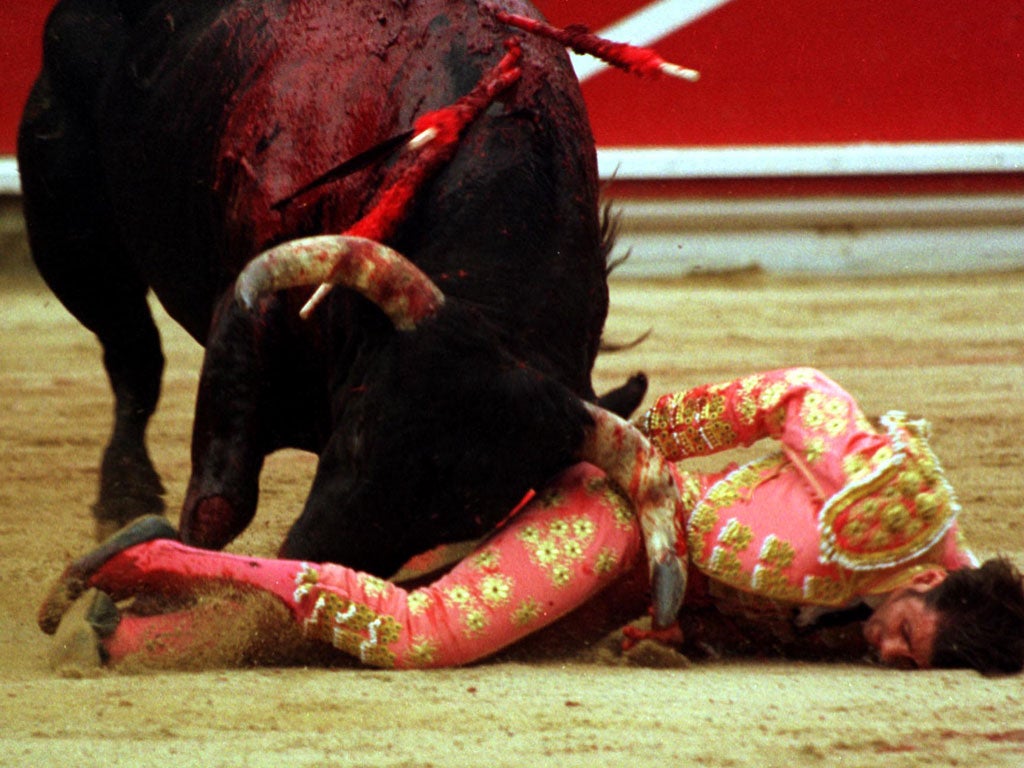Blinded matador returns to ring to fight another day

His face is still partly paralysed, he cannot chew food, his balance is shaky and he has lost the sight in his left eye for good – but less than five months after a horrific goring, matador Juan José Padilla is to make a triumphant and unexpected comeback.
The last time the public saw Mr Padilla, he was stumbling out of a bullring last October in Zaragoza, blood gushing from major head injuries, and screaming: "I can't see."
In an interview with the newspaper El Mundo, friend Adolfo Suarez Iliana – who was at the fight and in the ambulance with Mr Padilla afterwards – said that when the bullfighter was struck by the horn of the 600kg bull, named Marques, the impact had been so violent that "[Mr Padilla's] face was torn off, from the ear to the nose, destroying his hearing, his facial nerves and muscles.
"His eyeball was pushed out of its socket by the horn's point. I have seen countless gorings and this was the most damaging I have ever seen. He was close to losing his life."
A five-hour emergency reconstruction of his lower face with titanium plates and mesh was successful, and Mr Padilla, 38, took the first faltering steps along what has been an exceptionally fast recovery.
"The most glorious moment came when I announced to my family I was going back to bullfighting," Mr Padilla, whose nickname is El Ciclon de Jerez [The Cyclone of Jerez], told El Mundo, ahead of tomorrow's comeback in Olivenza in western Spain.
"My wife didn't want me to go back, but she had seen me in the hospital's corridors using a towel to make [bullfighting] passes. And when I got home, she understood my happiness lay with bullfighting."
During his recovery, Mr Padilla – 18kg lighter than before his accident and wearing a large eyepatch – has killed 10 bulls in training.
And while he recognises that when he re-enters a ring for real, his limited field of vision could cause him problems when the bull brushes past his left side, Mr Padilla insists he is determined to make a go of his career again. "My top priority is to be a bullfighting star," he said. "Questions like getting my eyesight back come second."
The goring in Zaragoza was the 26th of his 18-year career, the previous most serious was when a bull's horn pierced his neck in 2001 in Pamplona.
"I love my profession more than ever. This time it's been my turn, but everybody knows when they get into this what can happen to you," Mr Padilla said. "Gorings are like medals."
Mr Padilla will not be Spain's first one-eyed matador. In 1983 in Seville, a bull gored Lucio Sandin in the right eye but he returned to the ring two months later. "The difference is that Padilla's goring was far more violent," Carlos Iliana, one of Spain's most longstanding bullfighting correspondents, told The Independent. "And it was live on TV, so it had a huge media impact. Either way, it has enormous merit that, with his face half-paralysed and blind in one eye, Padilla is prepared to face a bull again. He is a very brave man."
"I'm not coming back to make people feel sorry for me, I'm coming back to fight," said Mr Padilla, who faces more surgery before he makes a full recovery. "I will go in the ring, I will look at the sky and give thanks to God."
In the ring: A dying sport
The comeback of Juan José Padilla is one of the few pieces of good news in recent years for Spanish bullfighting, beset by economic difficulties, a steadily aging fan base and an outright ban in Catalonia since 2011.
Since the start of the economic downturn in 2007, the number of bullfights held in Spain has dropped by a third, and polls last year showed more than 60 per cent of Spaniards disliked it. It is now most popular among the over-45s.
Subscribe to Independent Premium to bookmark this article
Want to bookmark your favourite articles and stories to read or reference later? Start your Independent Premium subscription today.

Join our commenting forum
Join thought-provoking conversations, follow other Independent readers and see their replies